|
|
|
Sort Order |
|
|
|
Items / Page
|
|
|
|
|
|
|
| Srl | Item |
| 1 |
ID:
163237
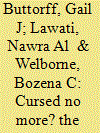

|
|
|
|
|
| Summary/Abstract |
Recent scholarship posits that the resource curse has gendered as well as economic effects on oil-rich economies, like those in the Middle East and North Africa, entrenching paternalistic relationships that disadvantage women’s entry into the labor force. Upon closer examination, however, it appears that oil may not be the most compelling argument to explain Arab women’s low presence in the workforce –– especially since women’s labor-force participation within the oil rich Gulf Cooperation Council (GCC) states is generally higher than the regional average. We contend that this is, in part, a byproduct of the countries’ labor nationalization policies. Our analysis suggests that oil-driven development can in fact boost female labor force participation, revealing that rentierism as experienced in the GCC can actually have positive externalities for women
|
|
|
|
|
|
|
|
|
|
|
|
|
|
|
|
| 2 |
ID:
163239
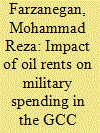

|
|
|
|
|
| Summary/Abstract |
This study shows how the level of corruption matters in the way oil rents affect a state's military spending. Using panel data covering the 1984–2014 period for the Gulf Cooperation Countries (GCC), we find that the effect of oil rents on military budgets depends on the extent of political corruption. Oil rents are negatively associated with military spending of the GCC countries. However this, in turn, is moderated by higher levels of corruption. For comparison, we examine this association in non-GCC countries in the MENA region, finding a positive effect of higher oil rents on military spending: this effect is larger in corrupt polities within non-GCC countries. The intermediary role of corruption in the military-oil nexus is robust, controlling for a set of variables that may affect military spending.
|
|
|
|
|
|
|
|
|
|
|
|
|
|
|
|
| 3 |
ID:
163230
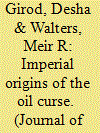

|
|
|
|
|
| Summary/Abstract |
The literature maintains that oil creates a curse on development in countries with weak national institutions at oil discovery, but offers little guidance on the specific institutions that help leaders avoid the curse. We trace rent distribution in Kuwait and Oman, apparent outliers that experienced development despite their weak national institutions at oil discovery. Unlike other examples of the oil curse, Kuwait and Oman contained a strong informal institution that compelled rulers to spend oil revenues on human development: a balance of power between leaders and their domestic rivals. Because informal balances of power are also present in countries with strong formal institutions that avoid the oil curse, this article suggests that the presence or absence of informal balances of power may help account for whether oil is a blessing or a curse.
|
|
|
|
|
|
|
|
|
|
|
|
|
|
|
|
| 4 |
ID:
163228


|
|
|
|
|
| Summary/Abstract |
Oil has seriously impacted the institutional development of the state in the Arabian Peninsula. More specifically, the sudden and unprecedented acquisition of massive oil revenues resulted in the freezing of the state’s formal and informal institutions, at the point at which petrodollars were injected into the state’s coffers. From then on, state leaders were able to deploy the state’s wealth to dictate the pace and direction of institutional change. Over time, any institutional change has been directed towards enhancing regime security, and the pace of change has been calculated and deliberately slow. Any political opening has been dictated by the logic of state power maximization (in relation to society). At the same time, partly to ensure its popular legitimacy and partly through the vision of its leaders, the state has deployed its massive wealth both to foster rapid economic and infrastructural development, and to enhance the living standards of its citizens. In other words, whereas oil may have stunted institutional development –– i.e., an institution’s curse –– it has been an economic blessing.
|
|
|
|
|
|
|
|
|
|
|
|
|
|
|
|
| 5 |
ID:
163235
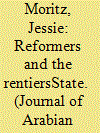

|
|
|
|
|
| Summary/Abstract |
The oil and gas-rich states of the Gulf Cooperation Council have long been treated as exceptional, where distributions of rent-based wealth to society assumedly preclude political dissent. Yet, by examining informal and formal opposition in Qatar, Bahrain, and Oman since 2011, this article disputes the effectiveness of this “co-optation mechanism” at the sub-national level. Drawing from 135 semi-structured interviews conducted with citizens of these states, it uncovers evidence of challenges to state authority even among nationals who should theoretically be co-opted. In examining the limits of rent-based co-optation, the article highlights two key political dynamics that have demonstrated a capacity to overpower rent-based incentives to remain politically inactive: ideology and repression. Societies, then, were far from quiescent, and this research examines the networks and dynamics that have allowed citizens to challenge state authority.
|
|
|
|
|
|
|
|
|
|
|
|
|
|
|
|
| 6 |
ID:
163233
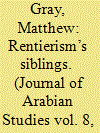

|
|
|
|
|
| Summary/Abstract |
his paper examines rentier state theory (RST), and specifically “rentierism” as a more refined and nuanced variant of RST, arguing that while rentierism provides considerable utility in explaining the state-society relationships of the contemporary Arab states of the Persian Gulf, it is insufficient as a stand-alone explanation, and needs to be considered as a political dynamic of the state-society relationship, rather than as a structural explanation for the state itself, as early RST more ambitiously sought to do. Rentierism therefore needs to be utilized in combination with two other explanatory frameworks, neopatrimonialism and state capitalism. In effect, these are rentierism’s theoretical “siblings”: they sharpen a rentier analysis by providing greater nuance about how elite networks, business-government relations, and personalized politics operate and interact in the allocative settings of the Gulf, as well as illustrating both the scope and the limits of rentierism as an explanatory framework.
|
|
|
|
|
|
|
|
|
|
|
|
|
|
|
|
|
|
|
|
|